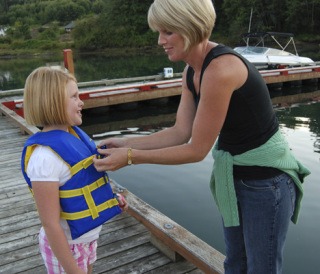Spring is the time of year when children begin to think about their summer days of freedom – and from child’s perspective, summer is a carefree time.
For parents and others who care for children, summer is anything but carefree. The warm weather brings water play and other outdoor activities which demand close supervision, monitoring use of protective gear and teaching personal safety.
While protective gear, such as helmets and lifejackets are the tools of summer safety, adult supervision is at the heart of a safe summer. In the home environment, this means knowing where the kids are and what they are doing. Take turns being the supervising adult and be free of alcohol, especially when the children are near water or engaged in other activities that could pose a danger.
Owning protective gear such as helmets, life jackets and knee, ankle and wrist pads is not enough. Parents need to make sure kids actually wear them and wear them properly. Helmets should be worn for all sports on wheels – bicycling, skating, riding a scooter and skateboarding. The helmet must fit properly with the strap fitting gently under the chin, not hanging loosely or worn in a way that exposes the child’s forehead. Knee, elbow and wrist pads can further reduce skating injuries. Experts at MultiCare offer custom-fit helmets for $7 and $10. They can fit anyone with a helmet and ensure a proper fit.
Life jackets, once again properly fitted, are necessary for children under 6 when they are on the beach, even when there is a lifeguard on duty, and necessary for all children and adults on docks, in boats or in any watercraft. The life jacket should fit snugly around the chest and not slip up around the head when the child jumps into the water. State law currently mandates that any child up to 12 years of age must wear a life jacket on a boat less than 19 feet long and all vessels must have at least one life jacket for each person on board.
Pools and hot tubs need to be secured to keep children from falling in or going in unsupervised. Wading pools should be emptied after use to assure that no one goes in without supervision.
Jet skis and personal watercraft are also popular and regulating their use is largely up to parents. By law, children must be 14 years of age to operate a personal watercraft. Under the new Mandatory Boating Safety Education Law, anyone over the ago of 12 must pass a safety exam before operating any watercraft over 15 horsepower.
Another potentially serious summer safety issue has been in the news recently. Children are at a serious risk for heat stroke when left alone even for a few minutes in a closed vehicle. Last year, at least 42 children across the United States died from heatstroke caused by being left or trapped in an enclosed vehicle.
Heat is much more dangerous to children than it is to adults. When left in a hot vehicle, a young child’s core body temperature may increase three to five times faster than that of an adult. This could cause permanent injury or even death. Heat stroke occurs when the core body temperature reaches 104 degrees Fahrenheit. A core body temperature of 107 degrees Fahrenheit is considered lethal.
This isn’t just true for hot days, either. The heat inside a car can be fatal even if the outside temperature is 70 degrees.
Kids are in the car more during the summer, and car seats, booster seats and seatbelts provide the best protection in the event of an accident. Recently, the American Academy of Pediatrics recommended that child remain in a rear facing car seat until the age of two. This protects their heads and necks should there be an accident. By law, children under 13 years of age are to sit in the backseat.
It also is important that children are safe outside the car. As more children go outside to play, they must be reminded not play around parked cars; and drivers should always walk around their parked car before driving away, to make sure the area is clear. Children cannot be seen by a driver, especially in a mini van or SUV, up to 18 feet behind a vehicle, making them very susceptible to back-over injuries and death.
Another potentially dangerous situation people often don’t consider when the weather starts warming up – open windows. The screens on windows are often not secured very well and can pop out, even with the slightest pressure. Window guards allow windows to be open, but block access for a small child. Window stops are also useful. These prevent the windows from being opened more than four inches. Both guards and stops are widely available at major home improvement centers.
With children, the possibilities for accidents seem endless. Some bumps, bruises, cuts and scrapes are simply part of being an active child, but many more serious injuries are preventable. By supervising carefully, especially around water, requiring use of protective gear, and teaching personal safety, parents can help instill safe habits in their children.
Deb Will is coordinator for the Mary Bridge Center for Childhood Safety and Safe Kids South King County.
====
Helmet sales and fittings
• Kent MultiCare Clinic – Each Thursday 3-5 p.m. and Covington MultiCare Clinic each Wednesday 9 a.m.-4 p.m.
Life Jacket Sales and Loans
• Kent MultiCare Clinic – Each Thursday 2-5 p.m. Loans are free, purchasing a jacket is $14.


